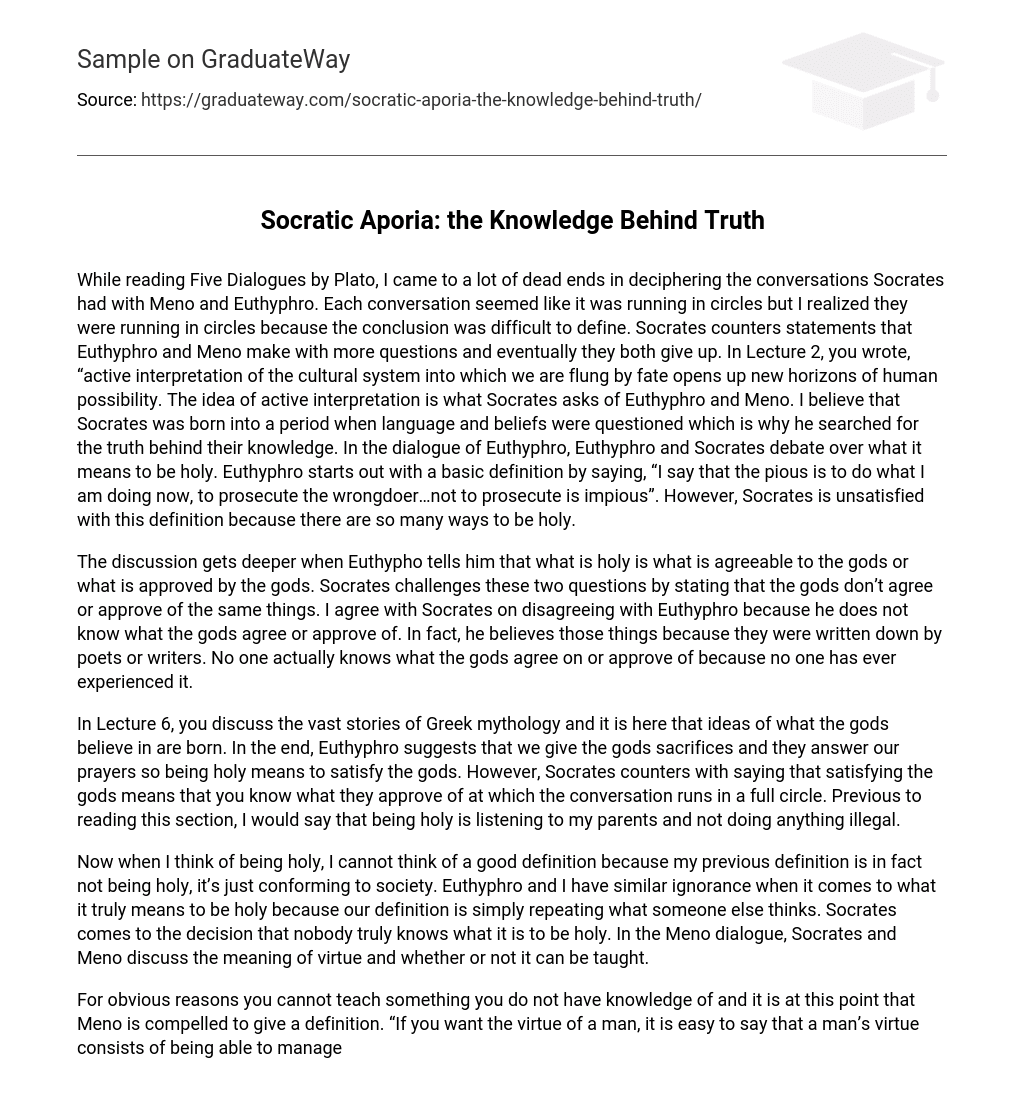While reading Five Dialogues by Plato, I encountered numerous obstacles in understanding the discussions between Socrates, Meno, and Euthyphro. It became evident that these conversations seemed circular because the conclusion was elusive. Socrates challenges the assertions made by Euthyphro and Meno by posing more questions, ultimately leading to their resignation. In Lecture 2, you mentioned the concept of “active interpretation,” which involves exploring new possibilities within the cultural system we are thrust into by fate. Socrates requests this active interpretation from both Euthyphro and Meno. I believe Socrates was born during a time when language and beliefs were being questioned, which motivated him to seek the truth behind their knowledge. In the dialogue between Euthyphro and Socrates, they debate the definition of holiness. Euthyphro initially offers a simplistic definition, stating that holiness is prosecuting wrongdoers and refraining from doing so is impious. However, Socrates finds this definition unsatisfactory due to the numerous interpretations of holiness.
The conversation becomes more profound when Euthyphro asserts that what is considered holy is whatever pleases or is endorsed by the gods. Socrates raises objections to these assertions by pointing out that the gods do not have unanimous opinions or endorsements. I concur with Socrates in his disagreement with Euthyphro, as Euthyphro lacks knowledge regarding the preferences or endorsements of the gods. As a matter of fact, Euthyphro’s beliefs are based on hearsay from poets or writers. Since no one has actually witnessed what the gods agree upon or approve of, it remains unknown.
During Lecture 6, Greek mythology is explored, shedding light on the beliefs of the gods. Euthyphro proposes that being holy entails offering sacrifices to the gods, as they then grant our wishes. Nonetheless, Socrates argues that understanding the gods’ approval is key to satisfying them, resulting in a circular discussion. Prior to studying this section, my personal understanding of holiness involved obeying my parents and abstaining from illegal activities.
Now when I think of holiness, I cannot come up with a proper definition because my previous understanding is not actually about being holy, but rather about conforming to societal norms. Euthyphro and I share a similar lack of awareness regarding the true meaning of holiness because our definition merely echoes what others believe. Socrates concludes that no one truly understands what it means to be holy. In the Meno dialogue, Socrates and Meno delve into the concept of virtue and its teachability.
Meno is forced to provide a definition after recognizing that one cannot teach something they lack knowledge of. According to Meno, the virtue of a man involves effectively handling public matters and utilizing such ability to benefit friends, harm enemies, and ensure personal safety. Similarly, the virtue of a woman is characterized by competent household management, preservation of its possessions, and submission to her husband. Meno’s depiction of virtue appears to heavily favor societal norms regarding male roles.
Although the current era is different from the time in which this conversation took place, it is disheartening to encounter the notion that a woman’s virtue is superficial. I personally believe that virtue entails behaving in a moral and ethical manner, based on one’s own standards. Socrates disagrees with Meno’s explanation, as he believes that justice itself is a virtue and cannot be used to define the concept. Ultimately, Meno and Socrates conclude that the world may appear confident in its knowledge, but in reality, it knows very little about the things it claims to be certain about.
The concept of Socratic aporia involves the moment when a false understanding is revealed, removed, and creates a blank space for the development of genuine knowledge (Aporias, Webs, and Passages by Nicholas Burbules). Socrates profoundly challenges the beliefs of Meno and Euthyphro regarding virtue and holiness, leading them to recognize the absence of truth in their knowledge. The act of questioning universally accepted ideas makes me aware that society often follows the same patterns as preceding individuals without contemplating the reasons behind them.





